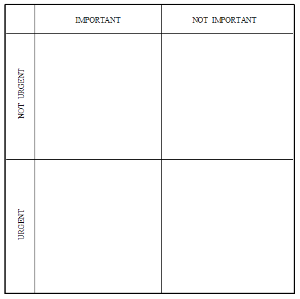Time management - Urgent v important part 1
Urgent v important part 1
Urgent
Urgent tasks are deadline based. This is usually independent of yourself and is often driven by others. The sooner the task needs completion the more urgent it is. This has no relation to importance. It is a simple matter to rank any jobs that you have in terms of their deadlines.
Important
The importance of a job drives how much ‘time’ you want to spend on it. Notice that this is independent of ‘urgency’ and is what you want to do not what time you actually spend on it. For any task the quality of your output will often relate to the time you spend on it. Again, it is a simple matter to rank the importance of the same tasks, for example, ‘high’ ‘medium’ or ‘low’ or a simple numerical ranking.
So which tasks would you naturally spend more time on?
The answer is those tasks that contribute to the completion of your goals.
This is the ideal scenario but in practice you may need to bend this slightly. For example, tasks that are delegated to you by senior management may have more time spent on them than warranted in order to cement your work relationships.
Tasks that you find un-enjoyable or un-relaxing could easily end up at the end of the queue for importance.
Matrix
The jobs that you have to complete can be added to a matrix table.
This is covered in more detail next.


